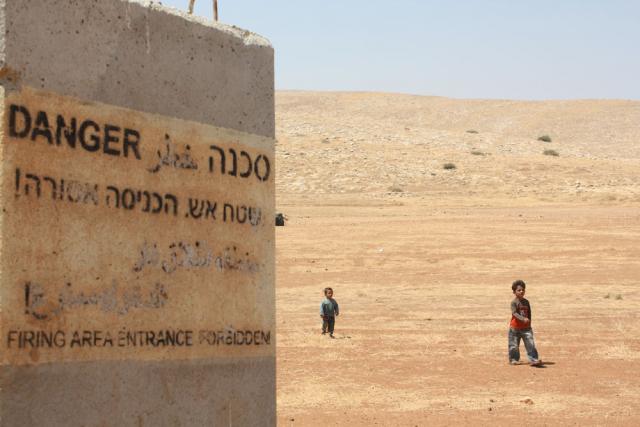WEST BANK BEDOUINS: WORSE OFF THAN GAZANS
AL HADIDIYA, WEST BANK, July, 28, 2010 (IRIN) — The road to al-Hadidiya village in the northeastern West Bank district of Tubas is dotted with boulders etched with a warning in Hebrew, Arabic and English: "Danger - Open Fire Area."
The boulders arrived about six months ago, and are positioned at the entrance to Palestinian villages, indicating that chunks of the Jordan Valley have become a closed military zone claimed by the Israeli army.
They signal a further squeeze on the Bedouin communities here.
Shepherd Abdul Rahim Bsharat, 59, and his family have lived and farmed in al-Hadidiya since the 1960s. At that time, he said, there were 400-500 families there. Now, there are 17, who stay on despite having no access to water or electricity. Every building in the village has an Israeli demolition order on it.
On 21 June, the Israeli military gave Bsharat notice that his house and animal shelters could be destroyed at any time. When Bsharat's house was previously demolished in 2002, his water tank was confiscated too. "If they destroy my property again, I’ll come back and rebuild it again. This is my land," he told IRIN.
Bsharat's home is a canopy of sewn-together sacks propped up over bare ground. It can easily be rebuilt. His other problems are more difficult to solve.
Al-Hadidiya is in a part of the West Bank under complete Israeli control, known as Area C. The estimated 40,000 Palestinians living there are unable to build or repair their homes, schools, hospitals or sewage systems under Israel's strict permit system, according to the UN Office for the Coordination of Humanitarian Affairs (OCHA). In a region where almost all families are herders, Israel’s restrictions on Palestinian access to and development of agricultural land mean thousands are going hungry, aid agencies say.
A report published recently by Save the Children UK entitled Life on the Edge, warns that many parts of Area C have plummeted into a humanitarian crisis more acute than in Gaza.
Israeli townships
Al-Hadidiya is surrounded by three expanding Israeli townships, Ro'i, Beka'ot and Hemdat. Its land is directly adjacent to Ro’i and the community collects any over-flow from the water pumps irrigating the settlers’ crops in rusting tins.
Despite a lengthy petition from Bsharat, Israeli authorities have not permitted al-Hadidiya to be connected to the main water network. There is no health centre and no permit to build one. The nearest hospital is several hours away in Jericho.
Israeli roadblocks and checkpoints mean that reaching a doctor can take hours. In 2002, Bsharat's then two-and-a-half-year-old son was hospitalized for 16 days when a common cold turned into pneumonia. In the same year, his eight-year-old son was badly injured falling off a tractor. It was six hours before a car could get through to al-Hadidiya to get him to hospital. He died from blood loss.
Israel has suffered deadly suicide bombings launched from the West Bank in the past and says strict rules on Palestinian movement enforced through checkpoints and roadblocks are necessary for its security.
According to the Israeli military, homes in al-Hadidiya and much of the Jordan Valley are being demolished because they have either been built illegally, without an Israeli building permit, or are located in "closed military areas." Around 18 percent of the West Bank is now a closed military zone.
Stunting
The UN agency for Palestinian refugees (UNRWA) found that in Bedouin communities like al-Hadidiya, rates of stunting are more than double those in Gaza. Almost half the children have diarrhoea, one of the biggest killers of children under five in the world, and three quarters of families do not have enough nutritious food.
Save the Children works with local NGO Union of Agricultural Work Committees (UAWC) to help families in al-Hadidiya repair damaged buildings and farmland, when possible. But the strict restrictions on building and access mean that the Palestinian Authority and aid agencies are limited in the help they can offer families anywhere in Area C.
"In recent weeks the international community has rightly focused on the suffering of families in Gaza but the plight of children in Area C must not be overlooked. Many families, particularly in Bedouin and herder communities, suffer significantly higher levels of malnutrition and poverty," Salam Kanaan, Save the Children UK's country director, said.
"It's now urgent that steps are taken to ensure children here have safe homes and proper classrooms, enough food to eat and clean water to drink."
----
This story first ran July 28 on the Integrated Regional Integration Networks (IRIN), a project of the UN Office for the Coordination of Humanitarian Affairs .
From our Daily Report:
Israel: police demolish Bedouin village
World War 4 Report, Aug. 9, 2010
See also:
BLOCKADE!
Dockworkers Worldwide Respond to Israel's Flotilla Massacre
by Greg Dropkin, LabourNet, UK
World War 4 Report, August 2010
-------------------
Reprinted by World War 4 Report, September 1, 2010
Reprinting permissible with attribution


















Recent Updates
8 hours 35 min ago
8 hours 39 min ago
8 hours 48 min ago
9 hours 6 min ago
1 day 14 hours ago
1 day 14 hours ago
1 day 14 hours ago
1 day 15 hours ago
1 day 15 hours ago
1 day 15 hours ago